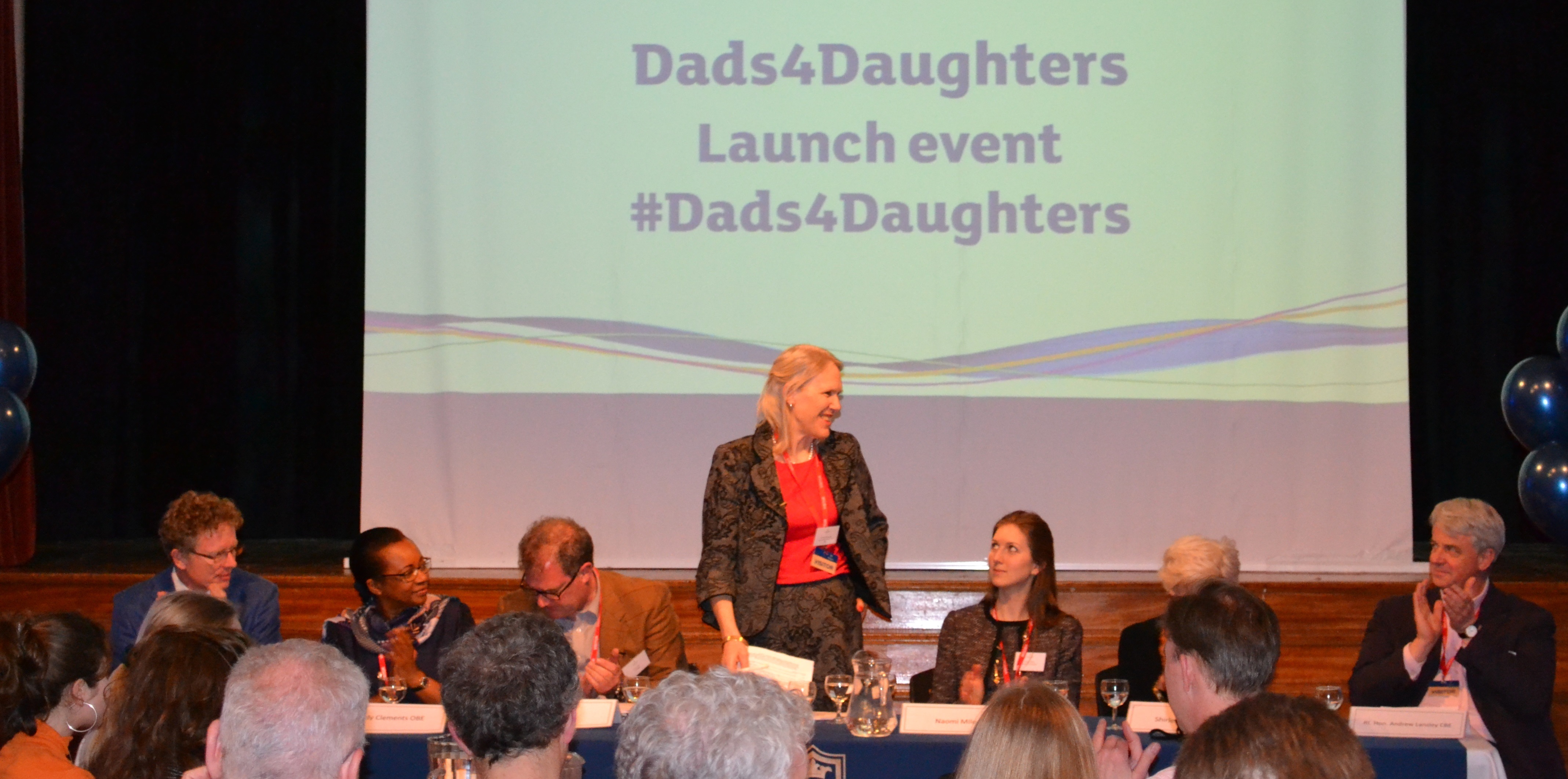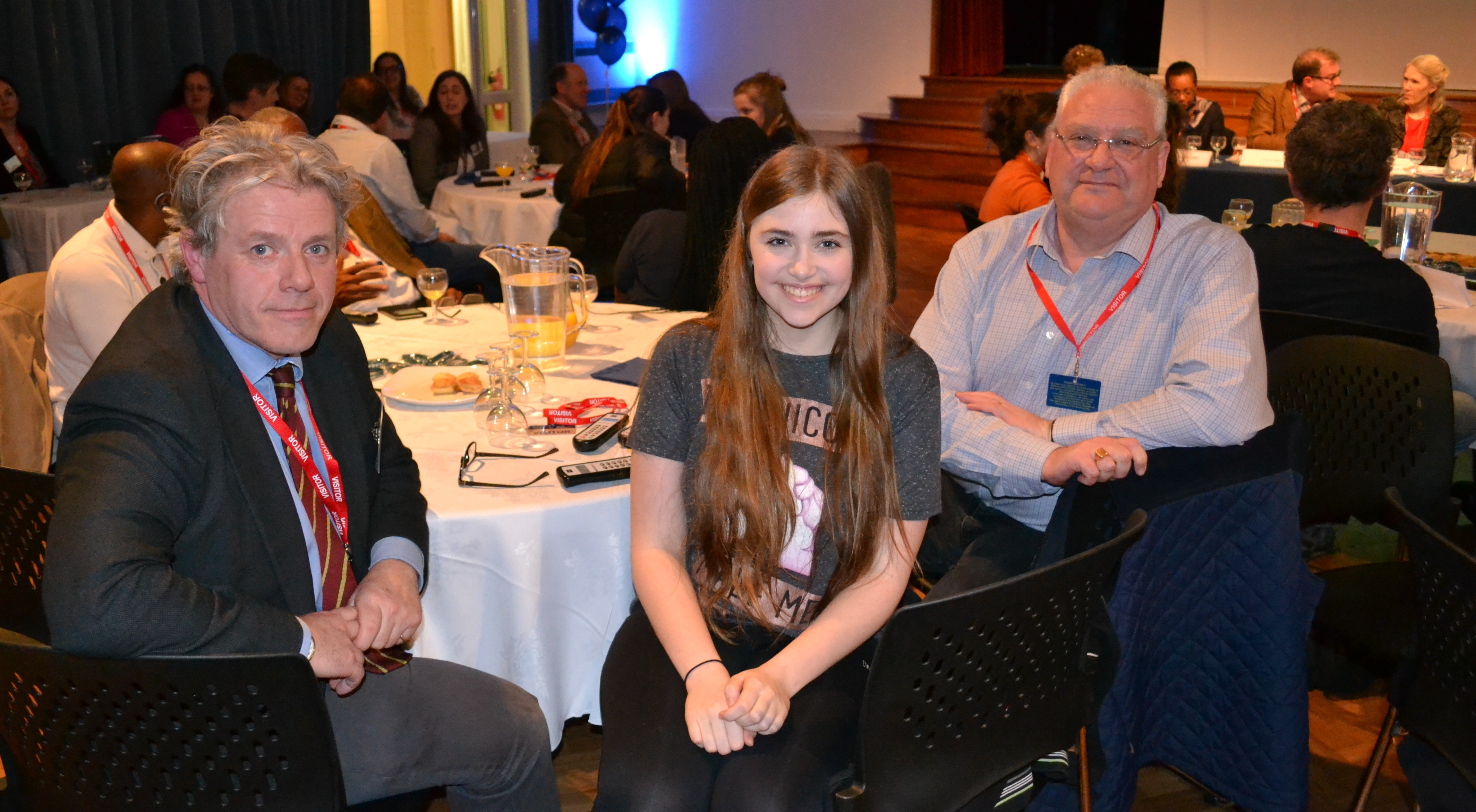Tackling workplace gender inequality: Dads4Daughters
We held our inaugural Dads4Daughters event on Wednesday 15 March at which 40 day girls and boarders from Year 10 to Upper Sixth were accompanied by some of the significant men in their lives (fathers, uncles, rowing coaches, and form tutors) to discuss workplace gender bias. Our school joined other Girls’ Schools Association (GSA) member schools across the country in marking the first national Dads4Daughters day.
Headmistress and 2017 GSA President Charlotte Avery greeted the audience: “We value enormously the role that women play in those jobs that are perceived to have been traditionally women’s roles – from being the first educator of their own children, or nursing the sick – but we equally value the contribution that women can make in those roles that were once thought of as traditionally male roles – perhaps as astronauts or football players. What is important is that each child is encouraged and equipped to pursue whatever ambition they choose for themselves; this is what we do at St Mary’s School, Cambridge.
“When our girls enter the workplace they are likely to encounter some level of gender bias. This is what we hope to address – to flag up some areas where both men and women are still perpetuating a sense of inequality in the workplace, whether knowingly doing so or not, and to promote positive action to tackle this issue.”

GSA member schools recently teamed up to survey their alumnae about their experiences in the workplace, the results of which set the format of our own Dads4Daughters evening. Six topics were discussed (for instance whether workplaces are becoming more equal, or what tactics will further equality most effectively) and the students attending were invited to vote and show whether they agreed or disagreed with the statements put to them. As student votes were calculated the GSA alumnae survey results were revealed and an impressive guest panel – including Lord Andrew Lansley, and expertly chaired by guest of honour Dame Sandra Dawson – debated each topic in a Question Time format with questions and comments from the floor, before students’ votes were revealed.
On many points alumnae and students’ views were well aligned: 71% of GSA alumnae have witnessed/experienced workplace gender inequality and 75% of school students expect to; 75% of GSA alumnae believe things are improving for women in the workplace, as do 71% of students. Of six suggested ways to encourage gender equality (including pay transparency, encouragement of positive male behaviour, and more widespread/generous paternity leave) there was unanimous agreement that seeing more senior female role models would have the greatest impact, and that both recruitment quotas and an attitude of ‘doing nothing and expecting attitudes to change over time’ would have least effect.
However the panel and audience were surprised to see how current students’ views on other questions differed to those of the alumnae surveyed. While only four in 10 alumnae have attempted to change gender inequality in their workplace, the live student vote results were met with applause, with nine out of 10 students committing to doing so. Interestingly, on the topic of whether men could do more to support women in the workplace, 75% of alumnae agreed that they could, but only 43% of students did. Of four areas of workplace inequality about which respondents might be most concerned, alumnae opted for unequal pay whereas students’ primary concerns were sexist attitudes (45%) and a lack of respect (41%).
 Emmanuella N., a Year 11 boarder from Nigeria who attended with two of her uncles, explained the role that fathers are already playing so effectively: “I want to be a chemical engineer. My dad is an electrical engineer, and he has shown me what it takes and told me that I can achieve it, so I think as much as positive female role models are important, fathers are role models too. He has encouraged me that I can succeed.”
Emmanuella N., a Year 11 boarder from Nigeria who attended with two of her uncles, explained the role that fathers are already playing so effectively: “I want to be a chemical engineer. My dad is an electrical engineer, and he has shown me what it takes and told me that I can achieve it, so I think as much as positive female role models are important, fathers are role models too. He has encouraged me that I can succeed.”
Ella B., Lower Sixth day student who attended with her father and is currently considering a career as an astrophysicist or politician, commented: “In recent years things have been solved by law. Now it’s attitudinal change that needs to happen, and this is more effective if it starts earlier in life – which is why this event is so important. Real change will take a long time to take effect.”
Concluding the event Dame Sandra Dawson commented: “Men at the moment are in power and so men need to be involved in change. Unconscious bias comes in lots of forms and it is always beholden on all of us to question why things are the way they are, and whether we are really as genuinely inclusive as we believe we are. My own children have helped me realise some of my own areas of unconscious bias, which is why events such as this are so essential, because hearing from these young women will help us all to further gender equality.”